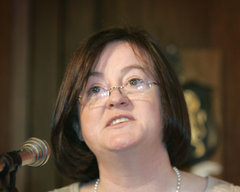Change the law first, not the Constitution says MarriagEquality
17 Feb 2008
 Gráinne Healy, MarriagEquality Co-chair, addresses the formal launch of MarriagEquality in the Mansion House, Dublin, on Monday 18 February 2008
Gráinne Healy, MarriagEquality Co-chair, addresses the formal launch of MarriagEquality in the Mansion House, Dublin, on Monday 18 February 2008Civil Registration Act could be amended in 24 hours to open civil marriage, or marriage in a registry office, to gay and lesbian couples
Instead of telling people that a Constitutional referendum is a fait accompli, politicians could quickly amend the Civil Registration Act 2004 to extend the right to marry to gay and lesbian couples, according to MarriagEquality, a new initiative launched today.
Grainne Healy, MarriagEquality co-chair, outlined that the change to the Civil Registration Act 2004 could be made at 24 hours notice, with political will and cross party agreement. Among its provisions, the Civil Registration Act 2004 provides for the reorganization of the registration of marriages.
She acknowledged that a constitutional referendum may indeed be necessary but stressed that this is not the certainty that government is currently presenting. If the constitutionality of the law is questioned, she said, the onus would be on the courts either to go with majoritarian consensus and uphold the legislation or strike it down.
"Throughout this debate the Constitution has been presented as an unmovable obstacle to civil marriage for gay and lesbian couples. But we don't know whether this is true," she said.
"Instead of presenting a constitutional referendum as a fait accompli, politicians should find out first by amending the 2004 Act and then see what happens. This would be progressive and brave legislating on behalf of all citizens."
She said that recent surveys, including research carried out by Lansdowne Market Research in December 2007, had picked holes in the notion that the Civil Registration Act expressed the will of the people.
"Research shows that the people of Ireland are ready for civil marriage for gay and lesbian couples," she said. "In fact, many think that gay men and lesbians can already get married and so think there is no problem."
She also explained that there is widespread support for civil marriage over civil partnership.
"People see immediately that civil partnership confers fewer rights, is a separate institution and is essentially unequal and discriminatory," she said. "It is a pity the legislators who represent them continue to fail to see this"
The government has committed to the Heads of a Bill, or draft legislation, on civil partnership by the end of March.
MarriagEquality's recommendations are contained in a comprehensive new position paper Making the Case for MarriagEquality in Ireland, written by independent researcher Dr. Jane Pillinger.
The paper argues that equal access to civil marriage is the only way that lesbians and gay men in Ireland can have equality. Anything less than this undermines the right to full participation in society, to choice, dignity, respect and equality, it concludes.
Among its provisions, the Civil Registration Act 2004 provides for the reorganization of the registration of marriages. It also provides for the extension of the system to allow for divorce, something which was not provided for in the original Constitution of 1937. However, the Act still currently precludes civil marriage for two people of the same sex (Section 2(2)(e)).
ENDS
For Better or For Worse
- Married couples and their children have constitutional protection. Gay and lesbian couples and their children are not protected by the Constitution.
- Children of gay families have no right to both parents.
- Married partners are entitled to spouse's pensions. Gay and lesbian couples are not; the pension dies with them.
- Married partners do not pay tax on inheritance. Gay and lesbian partners pay 20% inheritance tax, which can mean selling the family home to pay the tax bill.
- Married and heterosexual co-habiting couples can get parental leave and force majeure leave to look after their children. Gay and lesbian parents cannot.
- A married partner can make medical decisions in the event of illness or death. Lesbians and gay men are legally unable to make medical decisions for their partners.



 Marriage Equality is a proud member of NELFA
Marriage Equality is a proud member of NELFA